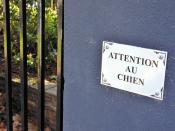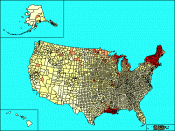Looking back on my childhood, I regret that I didn't learn more. I regret that I didn't seize every opportunity that came my way and I wish that I had paid more attention to my environment and the diversity of people around me. Because of this, I am grateful that I live in such a wonderful city where two very different cultures exist together.
Mordecai Richler once said that Montreal is the most agreeable city in Canada. And this is because the two cultures not only confront but also continue to enrich each other.
I disagree with Richler. Independence, or separation as it is sometimes called, has been at the top of the provincial agenda for over three decades. In the sixties, French-Canadian political organizations began demanding greater independence for the province and by 1976, the first separatist Quebec government was elected with a mandate to create an independent French-speaking nation.
Thirty years ago French-Canadians complained about the English business establishment, but today French-Canadian businessmen have themselves become the leaders. The economy isn't nearly as prosperous as it once was and that upsets everyone.
Since 1976, thousands of Quebecers and dozens of corporations have left for other Canadian cities or the United States. Those who left were primarily English speaking, and left because of their uncertain economic futures and because they did not see themselves as part of the larger vision of an independent, French-speaking Quebec.
Another thing that instigated French and English segregation were some of Quebec's strict laws. Bill 101 requires that all public and retail signs must have French text that is significantly larger than its English counter-part. Furthermore, only Quebecers who can prove that one of more of their parents attended Quebec English schools are permitted to be educated at English schools in the province.
The problem is caused by the Quebec government's identification of people according to their mother tongue. Language in Quebec, more than any other factor, determines the neighborhood you live in, your political affiliations, and the media you watch, read or listen to.
It is precisely Quebec culture that is at the center of the debate for French-Canadians who continuously insist that an overpowering English-speaking continent endangers their unique way of life.
While living in one city might allow us to learn about each other's cultures, I do not believe that the French and the English enrich each other. Cultures don't enhance each other because they don't interact. They build their own communities and live with each other, rather than assimilate with those that are not of their kind. We as Anglophones, react against intolerant ideas by rejecting French-Canadian language and culture. In retrospect, it is a lost opportunity for everyone to learn about each other.


